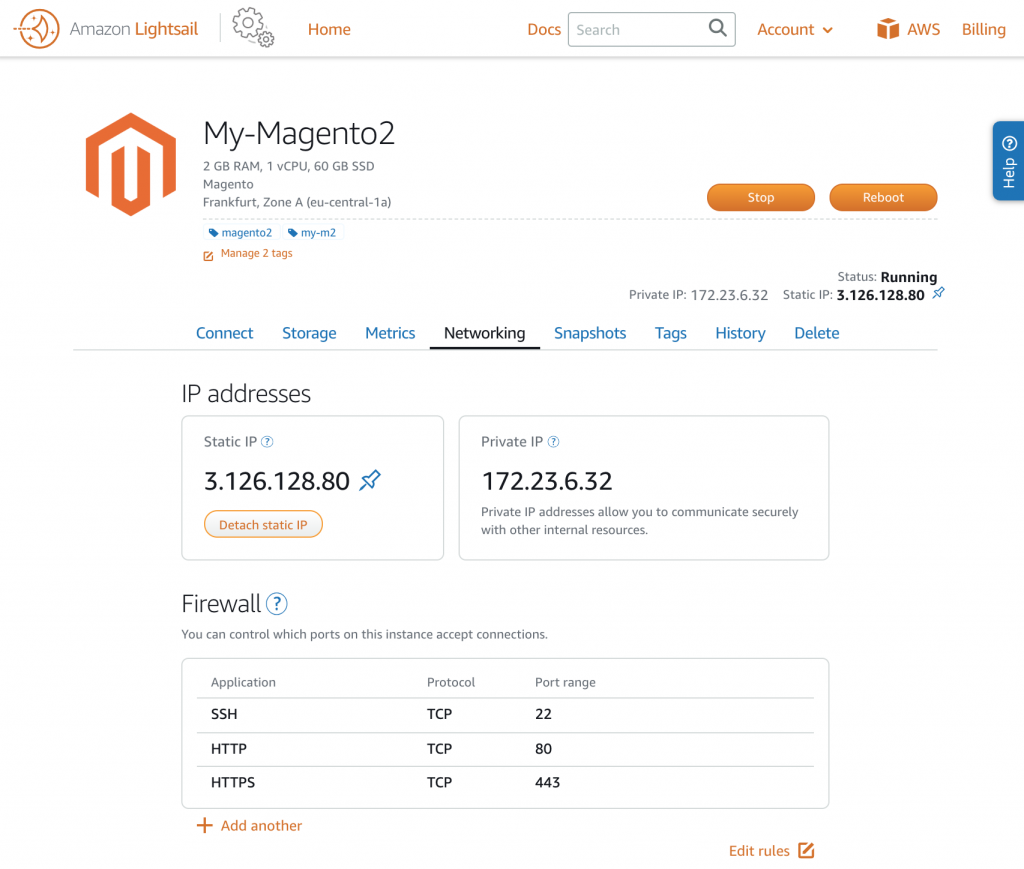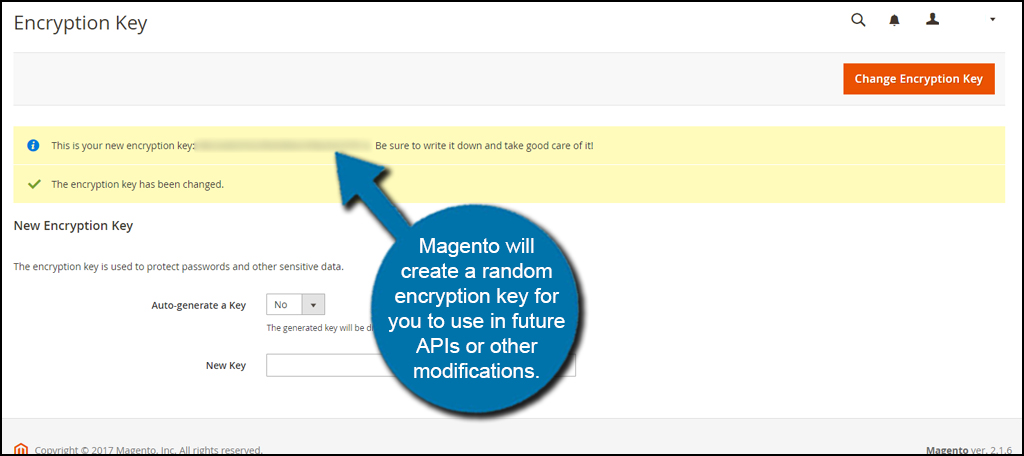From the Magento dashboard, select the System section and click “Manage Encryption Key.” Magento gives you two ways to generate this key. You can have it perform the encryption automatically or you can enter in a new key by hand. By default, Magento will offer the option to manually create a new key.
- Magento 2 Generate Crypt Key In Word
- Magento 2 Generate Crypt Key In Windows 10
- Magento 2 Generate Crypt Keyboard
- Magento 2 Generate Crypt Key In C
You should ask the cript key to Magento Enterprise Edition's Owner and decrypt it with CE. It would be fine because i'm sneaking to Magento Enterprise Edition's Code and the code is the same with Community Edition (for encryption/decryption). App/etc/env.php is populated with the details of your installation. Look at the contents crypt, and make sure that key doesn't have multiple lines appended to it, as was the case in my new installation, after running the setup:install multiple times. Changing this key for a current install would obviously be a bad idea. If this fixes you out, please let me know so I can log a ticket. All Submissions you make to Magento Inc. ('Magento') through GitHub are subject to the following terms and conditions: (1) You grant Magento a perpetual, worldwide, non-exclusive, no charge, royalty free, irrevocable license under your applicable copyrights and patents to reproduce, prepare derivative works of, display, publically perform, sublicense and distribute any feedback, ideas, code. Jul 23, 2015 In Magento 1.0, the configuration file that contains database settings and other information is located here: /app/etc/local.xml. In Magento 2.0, the configuration is in the same directory (/app/etc/) but has been renamed to env.php.The file path is: /app/etc/env.php In this file, a number of key things are set, including the database connection information. Magento Commerce Cloud packages. The Magento application uses Composer to manage PHP packages. The composer.json file declares the list of packages, whereas the composer.lock file stores a complete list of the packages (a full version of each package and its dependencies) used to build a release version of the Magento application. The following tables list packages from. In this tutorial you will learn what is the Magento encryption key and how to use it. The Magento Encryption Key is generated during the Magento Installation. It is used for the encryption and the security storage of the sensitive data in the script ’s database: The Magento Encryption Key is kept in the app /etc/local.
- October 2, 2015
- Posted by: Syed Shujaat
- Category: Cisco, Networking Solutions
Use this command to generate RSA key pairs for your Cisco device (such as a router). keys are generated in pairs–one public RSA key and one private RSA key.
If your router already has RSA keys when you issue this command, you will be warned and prompted to replace the existing keys with new keys.
NOTE: Before issuing this command, ensure that your router has a hostname and IP domain name configured (with the hostname and ipdomain-name commands).
You will be unable to complete the cryptokeygeneratersacommand without a hostname and IP domain name. (This situation is not true when you generate only a named key pair.)
Here are the steps to Enable SSH and Crypto Key setup : 2 config must requried for SSH
1 Setup Local VTY line User ID and password
router (Config) # Line VTY 0 15 /all-software-key-generator-2013.html.
router (Config-line)# login local
router (Config-line)# Exit
!!! create local login ID/Pass
router (Config)# username [loginid] password [cisco]
router (Config)# username loginid1 password cisco1

2. router (Config)# ip domain-name example.com
router (Config)# crypto key generate rsa
how many bits in the modulus [512] :1024
router (Config)# ip ssh version2
router (Config)# CTRL Z

Note | Secure Shell (SSH) may generate an additional RSA key pair if you generate a key pair on a router having no RSA keys. The additional key pair is used only by SSH and will have a name such as {router_FQDN }.server. For example, if a router name is “router1.cisco.com,” the key name is “router1.cisco.com.server.” |
This command is not saved in the router configuration; however, the RSA keys generated by this command are saved in the private configuration in NVRAM (which is never displayed to the user or backed up to another device) the next time the configuration is written to NVRAM.
Modulus Length
When you generate RSA keys, you will be prompted to enter a modulus length. The longer the modulus, the stronger the security. However, a longer modules take longer to generate (see the table below for sample times) and takes longer to use.
The size of Key Modulus range from 360 to 2048. Choosing modulus greater than 512 will take longer time.
| Router | 360 bits | 512 bits | 1024 bits | 2048 bits (maximum) |
|---|---|---|---|---|
| Cisco 2500 | 11 seconds | 20 seconds | 4 minutes, 38 seconds | More than 1 hour |
| Cisco 4700 | Less than 1 second | 1 second | 4 seconds | 50 seconds |
Cisco IOS software does not support a modulus greater than 4096 bits. A length of less than 512 bits is normally not recommended. In certain situations, the shorter modulus may not function properly with IKE, so we recommend using a minimum modulus of 2048 bits.
Syntax Description : Optional Strings to embed with SSH Crypto key
| general-keys | (Optional) Specifies that a general-purpose key pair will be generated, which is the default. | ||
| usage-keys | (Optional) Specifies that two RSA special-usage key pairs, one encryption pair and one signature pair, will be generated. | ||
| signature | (Optional) Specifies that the RSA public key generated will be a signature special usage key. | ||
| encryption | (Optional) Specifies that the RSA public key generated will be an encryption special usage key. | ||
| labelkey-label | (Optional) Specifies the name that is used for an RSA key pair when they are being exported.If a key label is not specified, the fully qualified domain name (FQDN) of the router is used. | ||
| exportable | (Optional) Specifies that the RSA key pair can be exported to another Cisco device, such as a router. | ||
| modulusmodulus-size | (Optional) Specifies the IP size of the key modulus.By default, the modulus of a certification authority (CA) key is 1024 bits. The recommended modulus for a CA key is 2048 bits. The range of a CA key modulus is from 350 to 4096 bits.
| ||
| storagedevicename: | (Optional) Specifies the key storage location. The name of the storage device is followed by a colon (:). | ||
| redundancy | (Optional) Specifies that the key should be synchronized to the standby CA. | ||
| ondevicename: | (Optional) Specifies that the RSA key pair will be created on the specified device, including a Universal Serial Bus (USB) token, local disk, or NVRAM. The name of the device is followed by a colon (:).Keys created on a USB token must be 2048 bits or less. |
| Command | Description |
|---|---|
| copy | Copies any file from a source to a destination, use the copy command in privileged EXEC mode. |
| cryptokeystorage | Sets the default storage location for RSA key pairs. |
| debugcryptoengine | Displays debug messages about crypto engines. |
| hostname | Specifies or modifies the hostname for the network server. |
| ipdomain-name | Defines a default domain name to complete unqualified hostnames (names without a dotted-decimal domain name). |
| showcryptokeymypubkeyrsa | Displays the RSA public keys of your router. |
| show crypto pki certificates | Displays information about your PKI certificate, certification authority, and any registration authority certificates. |
Magento2 Code Generator
This module provide possibility to generate code via command line tool.
Requirements
- Magento 2 (CE, EE) 2.1.0 and later
- PHP >=7.0
Installation
Install the latest version with
Usage
Currently, module supports the next commands:
Generating module skeleton.
- 1-st param is module name.
- 2-nd module version (not required, by default 0.1.0).
Generating 'Model Triad' by DB table.
- 1-st param is module name.
- 2-nd entity name.
- 3-th table name.
Magento 2 Generate Crypt Key In Word
Generating 'Crud' by DB table.
- 1-st param is module name.
- 2-nd entity name.
- 3-th table name.
Generating 'Plugins' (Interactive mode)
Magento 2 Generate Crypt Key In Windows 10
- 1-st param is module name.
In additional, all commands supports --dir option where you can specify your custom module directory.
Ex: --dir=modules/module-some-dir
Submitting bugs and feature requests
Bugs and feature request are tracked on GitHub
Author
Magento 2 Generate Crypt Keyboard
Rostyslav Tymoshenko
Magento 2 Generate Crypt Key In C
License
This project is licensed under the MIT License - see the LICENSE file for details